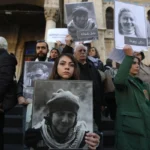The European Union announced that it will dispatch a high-ranking representative to Damascus on Monday to meet with Syria’s new leadership following the recent overthrow of President Bashar al-Assad. The decision, revealed by EU foreign policy chief Kaja Kallas, signals a significant diplomatic shift in the region.
“Today, our high representative for Syria is traveling to Damascus,” Kallas stated upon her arrival in Brussels for an EU foreign ministers’ meeting.
International Powers Engage with Syria’s New Leadership
Initially cautious, several foreign governments have accelerated efforts to engage with Syria’s new Sunni Islamist regime. The change comes just one week after Assad’s fall, which concluded his lengthy and controversial rule.
On Sunday, Geir Pedersen, the UN Special Envoy for Syria, visited Damascus. During his visit, he urged for increased humanitarian aid and warned against acts of retribution. “We must ensure that Syria receives immediate humanitarian support for its people and for refugees wishing to return,” Pedersen said. His visit marked the first by a senior UN official since Assad fled to Russia.
Global Response to Assad’s Fall
The fall of Assad’s government was welcomed by various countries and organizations. However, many expressed caution, particularly regarding the treatment of Syria’s ethnic and religious minorities by the new Sunni Islamist leadership. Despite this, several nations have moved quickly to establish diplomatic links.
On Saturday, the United States initiated contact with the new authorities. By Sunday, the United Kingdom followed suit. UK Foreign Secretary David Lammy announced that Britain had made “diplomatic contacts” with Hayat Tahrir al-Sham (HTS), the Islamist group now leading the coalition that ousted Assad. While acknowledging HTS as a “banned terrorist organization” in the UK, Lammy noted that diplomatic engagement was necessary under the new circumstances.
France and Other Nations Take Action
France also announced that it would send a diplomatic mission to Damascus on Tuesday, marking its first visit in 12 years. This mission aims to establish preliminary contact with Syria’s new rulers.
Meanwhile, Qatar declared that a delegation had arrived in Syria on Sunday and held talks with members of the transitional government. Qatar is preparing to reopen its embassy in Damascus, signaling a willingness to normalize relations.
Turkey Reopens Embassy
Turkey, a long-time key player in the Syrian conflict and supporter of the new authorities, took swift action by reopening its embassy in Damascus on Saturday. This move came after more than a decade of closure and highlights Turkey’s strategic alignment with Syria’s new leadership.
Read also: European Union: Aspiring Commissioners Face the Test
Diplomatic Challenges and Future Uncertainty
While these steps indicate a readiness to engage with Syria’s new government, significant challenges remain. The new leadership, dominated by Sunni Islamist factions, will be closely monitored for how it handles Syria’s diverse population. The international community remains cautious, seeking assurances on human rights and the protection of minorities.
The situation in Syria continues to evolve rapidly, with the diplomatic community carefully balancing engagement and scrutiny. The EU’s decision to send a high representative is a critical step in shaping future relations with a post-Assad Syria, underscoring the region’s importance in broader geopolitical dynamics.
As the world watches, the focus remains on humanitarian aid, political stability, and preventing a resurgence of violence. The next steps taken by Syria’s new leadership will likely determine the extent and nature of international support moving forward.
This article is originally published on .rtbf.be









